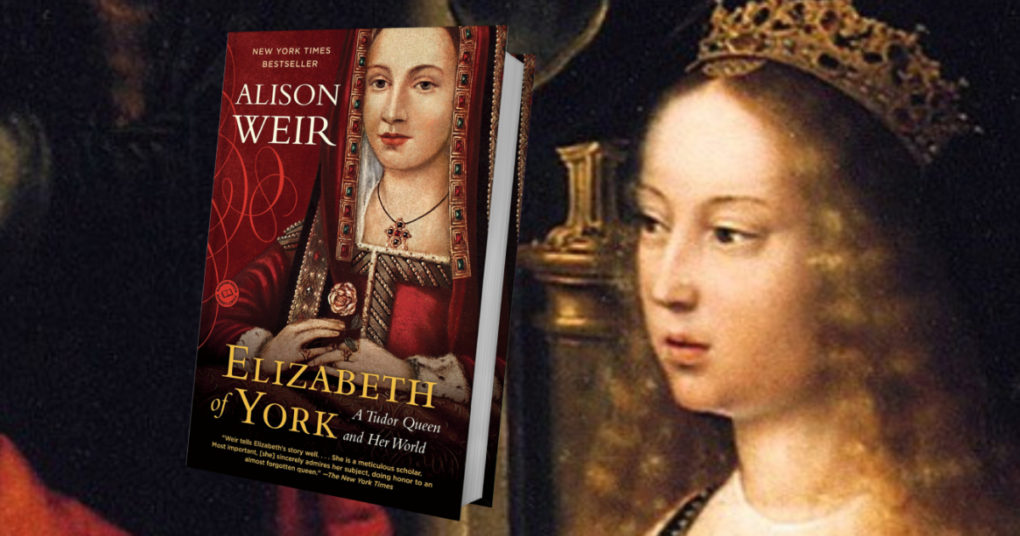Does history repeat itself? Yes, but it’s complicated. Sometimes its repetitions are relatively simple – the folly of Hitler in invading Russia replicated the folly of Napoleon nearly 150 years earlier. The folly of financial speculation peppers the centuries with booms and busts. Alison Weir is a historical biographer, specialising in English monarchs of the late Middle Ages. Her best-selling biography of Elizabeth of York, Queen Consort of the first Tudor king of England, Henry VII, – Elizabeth of York: A Tudor Queen and Her World (Ballantine Books)– was published five years ago. It is a book with a powerful subtext of historical echoes.
Weir tells the story of Elizabeth, daughter of the last Yorkist victor of the Wars of the Roses, and the turbulent times in which she grew to womanhood. She takes us through the concluding years of that conflict and the pivotal part Elizabeth played in securing the uneasy peace which succeeded the defeat by the Lancastrian Duke of Richmond – who became Henry VII – of her scheming and murderous uncle, Richard III. Richmond defeated Richard at the Battle of Bosworth Field in 1485 and not too long afterwards, as Henry VII, helped cement an uneasy peace for the kingdoms of England and Ireland by marrying Elizabeth. She was the eldest daughter of Edward IV and ostensibly the heir to his throne. Their marriage created the Tudor dynasty, which lasted just over a century, until the death of Elizabeth I, Henry VII’s granddaughter.
But that is the surface of the story of Elizabeth. Doubtless it has many lessons to offer. But the more subtle echoes are contained in the details about Elizabeth and early Tudor society. Even in a time when people played fast and loose with the rule of law, when values subscribed to were often blatantly not adhered to – such as the value of human life – these people were still, at heart, deeply Christian. Men might do wrong, but at least they knew they were doing wrong.
This story ends with two deaths. The Queen died in 1503. The year before, Henry VII’s heir, Prince Arthur, the fifteen-year-old husband of Catherine of Aragon, had died. After much diplomatic manoeuvring, Arthur’s eleven-year-old brother, Prince Henry, now heir to the throne, was betrothed to his young widow.
We know the tragic story which unfolds in the sixteenth century – when the Protestant Revolt took hold in Germany and France and seeped into England. We know what happened when Henry VIII allowed his libidinous urges to be manipulated by a clique of opportunists and Protestant reformers. We know what happened when greedy parvenues plundered the wealth of the Church and destroyed the faith and the devotional life of the people. Historian Eamon Duffy has chronicled the destruction. He cleared the air of the untruths circulated by earlier historians that English society was already ripe for the Reformation by showing us how sincerely devout the English people were. Weir’s biography tells us the same story from a different angle.
How is it similar to today’s troubles? Just as Tudor England changed from devout Catholicism to fanatically anti-Romish Protestantism, modern Ireland (where I live) has changed from Catholicism to secularism. It is happening elsewhere as well. Once-devout nations have been colonised by an alien culture, a culture of individualism, selfishness, and materialism. Cultures die. But as this life of Elizabeth of York demonstrates, they die corrupted by human agents. She was a faithful wife to a faithful husband. Her son was an adulterer who married six women. No wonder Catholic culture died in the sixteenth century.
In Ireland, England, America and further afield we are confronting a similar disintegration of our Christian societies. In Ireland, it is happening at a bewildering pace. Why? Because like the early Tudors, we ignore faith, prayer, devotion and (for Catholics) the sacraments. Let’s not be too pessimistic. There are also echoes of revival. But if this happens, it will be by one agency and one agency only – by returning to the values so admirably lived by Elizabeth of York and so exhaustively recounted by Alison Weir.
About the Author: Michael Kirke
Michael Kirke is a freelance writer, a regular contributor to Position Papers, and a widely read blogger at Garvan Hill (www.garvan.wordpress.com). His views can be responded to at mjgkirke@gmail.com.

